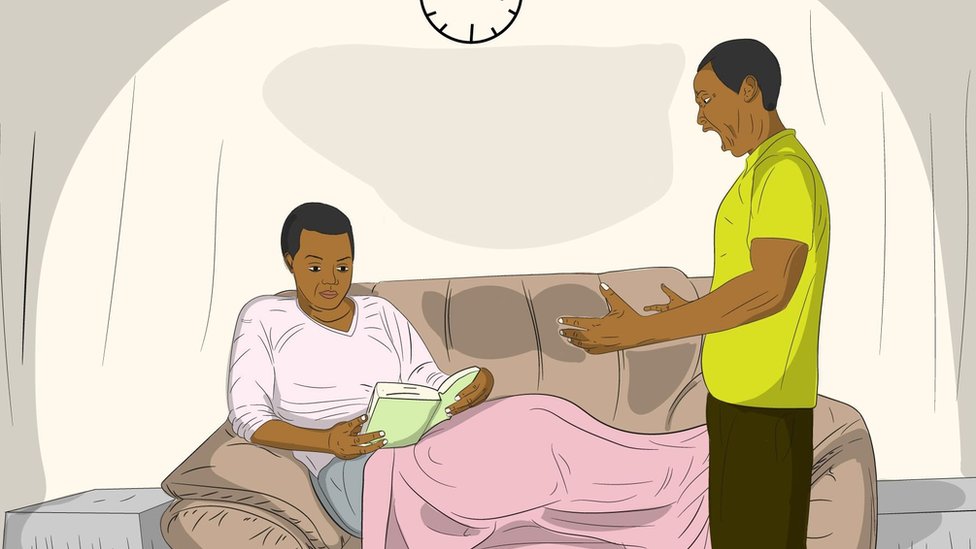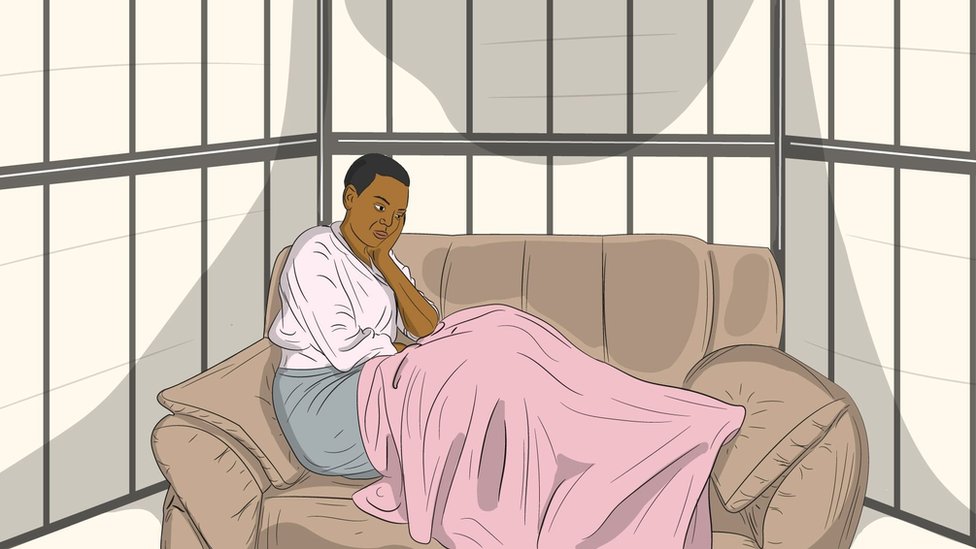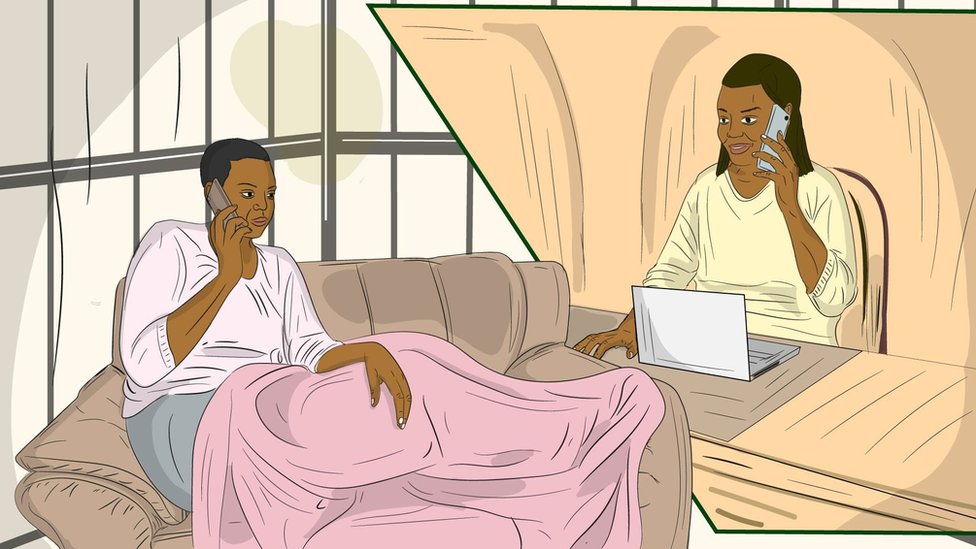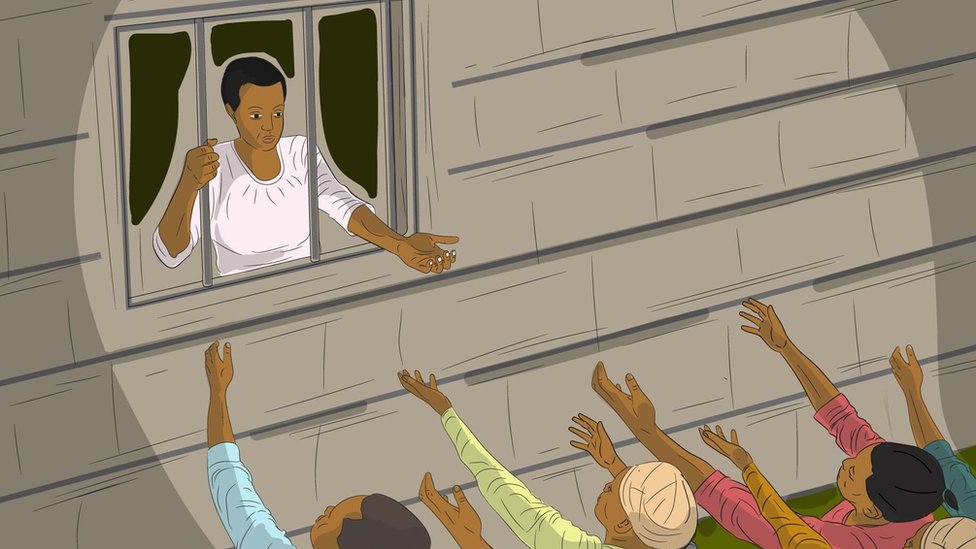
Di United Nations don describe violence against women during di coronavirus lockdown as “shadow pandemic”.
Across Africa, goments, police and activists report increase in attacks on women and girls wey trap for lockdown with abusive partner or relative. So wetin you fit do if you find yourself in dis kain of situation? We ask experts and one survivor of domestic abuse to share dia advice.

“Wen you dey for inside abusive relationship, you go notice one pattern,” Esther* tell me, as she tink back to di three years she spend married to man wey she tok say bin dey abuse her regularly – physically and verbally.
“Weekends dey always worse, because everybody dey for house. Your partner get more time for dia hands and fit get bored too. So you go see say dem wan find trouble. Dem go set you up – say something wey go make you react and den hit you wen you react.
“If two days fit make pesin dey bored enough to make dem wan hit you, imagine wetin one month or so of lockdown don cause pipo. No be just boredom dis time, na stress, na fear.”

Several years don pass now since Esther leave her husband. And even though, practically, e bin dey more easier to comot dan e go be today, e still take time and courage.
”I feel say I dey place wia get bars and I no fit comot because economically, emotionally, psychologically, e hard well well – and den my children dey too. Also, your mama dey happy say you don marry, so you dey reason – keep her happy. Stay.”
For women wey wan leave dia partner now during lockdown, di challenge dey even bigger. If dem try to leave, police fit challenge dem say dem break curfew and dem fit struggle to find public transport.
Many kontries don set up helplines, dey offer advice and support to victims. Demand for dia services dey high.
‘Rise in abuse cases’
During di first week of lockdown for South Africa, police receive 2,320 reports of gender-based violence – 37% higher dan usual.
For Zimbabwe, one helpline say di number of abuse cases dem document bin triple, while Nigerian gender advocate, Dorothy Njemanze, tell BBC News say she dey worried by di rise of abuse cases for her kontri: “We fear say if e continue dis way, we fit record some deaths before di lockdown over.”
Some African states dey take practical steps to help women. For Tunisia, wey don see five-fold increase in reports of domestic violence, di goment don set up free helpline and allocate eight shelters for victims and dia children, with more facilities on di way.

For some oda place dem, many shelters don manage to stay open and volunteers dey able to help women to escape.
For Zimbabwe, di Roots One Stop Shelter dey currently house 21 adults and seven children. Di director, Beatrice Savadye, say dem dey manage to rescue women from dia homes and dey also get referrals from police.
‘Safe house for women’
For Kenya also, social worker Dianah Kamande say shelters still dey able to house women and say her organisation don already rescue 17 women for Nairobi alone.
For Nigeria, although most women shelters don close as part of di lockdown, volunteers still dey able to help women escape and move in with dia relatives, according to Titilayo Vivour, di coordinator for di Lagos State Domestic and Sexual Violence Response Team.
But for Ghana main safe house, di Ark Shelter, director Nana Sunnu say dem dey unable to take in new clients because of di infection risk and lack of quarantine facilities.
Esther, wey survived violent marriage and dey work with fellow survivors now, say make women still call di helpline even if dem dey for kontri wia di shelters dey closed.
“Try and reach out to activists wey dey for social media, activists wey you fit trust. Call dem, dem fit still do something even for dis lockdown situation.”

Make Communities also look out for neighbours wey dem tink say fit dey exposed to violence, according to South African psychologist Nthabiseng Ramothwala. She also advise women to seek help from di pipo around dem.
”Know police officers and emergency numbers you fit call,” she tell BBC.
“Involve your neighbours as well, tell dem signs to look out for so you to know wen to help. Give dem numbers of close relatives wey fit come rescue you.”
‘We dey try to survive’
And for those wey really fit no escape, Esther get some final advice.
“You no need to stop your voice to make someone else feel better, but for dis situation, if dme tok something wey pain you, just ignore dem. If dem annoy you, go read book, do something else to take your mind away from dem.
”If you fit survive di next one or two or three months… den do whatever you need to do. I no know if we fit call these kinds of measure solutions. Dem just be stop-gap measures.
“Right now we dey try to survive, so say wetin dem need to hear, do wetin dem need you to do. Just survive dis.”








